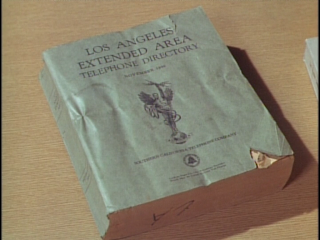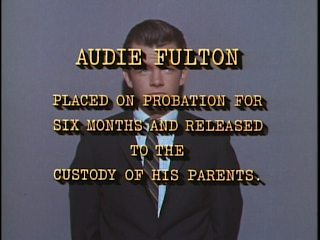"This is the city--
Los Angeles, California.
It's a big place -
and getting bigger all the time.
Twenty years ago, this was our telephone book:
Today it takes these five books to do the same job.
People move here from all over the country looking for a new life."
(Enter the beloved "Pandora's Box" clip, as introduced in S1e1, and the clearest we have yet seen it:)
"Some leave their inhibitions back where they came from.
And their sense of right and wrong.
That's when I go to work. I carry a badge"
Here's the demolished Georgia Street Juvenile Building establishing shot:
Lots of going places in this episode. Another police station, a high school, a department store a couple of times, somebody's house. Lots of sets to showcase that stripped-down Dragnet visual style.
Let's breathe it in, shall we?
Art Balinger delivers our first Dragnet Monologue of the episode, which gives us a feel for the social mores circa fifty years ago:
"It's not just a problem of law enforcement. It's a community problem. What it boils down to is a new morality, doesn't it? A whole new sense of values. The kids see it on television, in magazines, even hear it from the pulpit. God is dead. Drug addiction is mind-expanding. Promiscuity is glamorous. Even homosexuality is praiseworthy. How are you going to fight that? But you gotta remember that the vast majority of the juveniles you're handling are the kids next door. They're not hardcore criminals. It's just that for them, it's a great deal more important to be accepted by the other kids than to please their parents."
Soundstage pretending to be the back of a department store:
I love red carpet.
HELLO I ENJOY RED CARPET AS WELL
Orange naugahyde sofa, a glass ash tray, some European-looking line drawings, a table lamp...
I don't think he's dressed all that weird, considering spandex wasn't a thing, yet. And his hairstyle is pretty conservative. His collar buttons down, even. Still, his mother's going to kill him!
(Oh, be realistic. We all know Peggy Webber's no murderess.)
"All right, Bob. You're under arrest."
Oh-oh! Here comes Peggy Webber, ready to look tragic!
Oh, Pegs. No one looks tragic as well as you do. She gets a relatable monologue about the bell jar of suburban modernity that persists even forty-six years later:
"It's like living in a big vacuum out here. Do you know that? Back home we used to have friends, neighbors. Out here all we have are people who happen to live next door. We've lived in the same house for two years, and we still don't know anybody, not really. Not like it was back home. Nobody's got any roots out here. My husband says it was like being in the Army. First thing you ask somebody is where they're from. You know what I mean? Nobody belongs to anybody or anything. We're all strangers. It makes it difficult, you know."
The next three shots follow Friday and Gannon's car down the street to Millard Senior High School, which doesn't seem to exist:
Hello, Mr. Vice Prinicpal. I see you're good at golf because you have a golf trophy. Gives some depth to his character before his Dragnet Monologue:
"They call them clubs. But most of them are really just gangs. We have a lot of good organizations-- honor societies, things like that. We try to encourage those, discourage the other ones, the gangs. We have rules against them. We try, but we can't stop them. Oh, I don't know. Maybe they need 'em.
Belonging to a club or a gang gives them a sense of security, a sense of belonging somewhere. It gives them something they don't get at home. Things we all need-- love and affection, security, recognition, new adventure. Now, they don't get those things at home, they're going to look for 'em somewhere else-- in the Mod Squad, maybe, or the Hell's Angels-- instead of something worthwhile, like the Boy Scouts or the Y.M.C.A. And most times, it's a reasonable substitute. When they go bad, there's nothing much we can do about it. We have three thousand boys and girls here. We only have so much time. We try, but we can't do the parents' job for them. We only have 'em six or seven hours a day. The best we can do is try to give them an education. They're supposed to learn the basic values at home."
OK, let's meet our paisley-clad miscreants.
This one reminds me of a certain purveyor of false identification from 1980 by way of 1999:
Miscreant number two has an exceedingly snappy paisley shirt. Wow.
Miscreant three - he looks like more of a wild card.
And the top dog, Audie Fulton, who has the distinction of having puffy sleeves.
"Pardon me, mister policeman. Fuzz, sir?"
"Don't think you've come up with a new wrinkle, here. There's nothing new about being a thief. The state prison's full of 'em. Let me tell you about one of 'em. First time I met him, he was sixteen. Just about your age. His name was Jim. He went to school in North Hollywood. We picked him up for shoplifting. We talked to his parents. Seemed like a nice family, so we let him go. Couple of months later, we picked him up again-- at the wheel of a stolen car. This time he went to court. They put him on probation. Looked like he was going to straighten up. He didn't. Couple of weeks later, the owner of a liquor store picked him out of a show-up. He'd held up the store with a .22 rifle his father had given him for his birthday. I didn't see much of him after that. That was eight years ago. But I know he put in two years with the California Youth Authority. He got out and went home. His buddies from high school were all in the Army, married or thinking about getting married, and they didn't want to have much to do with him. Honest people don't like to be around thieves. The only people who'd associate with him were other thieves. And when thieves get together, they only got one thing in mind-- to steal something from somebody. They tried their hand at holding up a supermarket. They didn't make it. But they did manage to kill the manager. Jim's up at San Quentin now. He's 25. He's spent the majority of his life in jail. It's doubtful he'll reach his 26th birthday. His lawyers are trying to get the sentence commuted to life, but right now he's scheduled for the gas chamber on September 8th. Ten years ago, I told him what I'm telling you. When you live in a society, you either live by the rules or by democratic process you change 'em. You don't break 'em."
Audie Fulton's house - they have a maid at their place in Woodland Hills.
Looks like the repurposed interior of the lonely hearts club From Dragnet 1966/World Premiere Dragnet.
Open bar, like in The Graduate:
One. Expensive. Hairdo:
I'm still reeling. Her sense of parenting is about as solid as that of Blue Boy's Mom.
Back at West Valley Juvenile, there's always a comforting collection of phone books in the lower right corner of the shot:
Audie Fulton
Placed on probation for six months and released to the custody of his parents.
Roger Mobley as Audie Fulton
Andrea King as Mrs. Lisa Fulton
Peggy Webber as Mrs. Peggy Lassin
Richard Crane as Sergeant John Pearson
Art Balinger as Captain Lou Richey
Mickey Sholdar as Robert Lassin
Russell Arms as David Carroll
Alan Dexter as Hal Rosten
Art Direction - Russell Kimball
Set Decor - John McCarthy and Ralph Sylos
Written by David H. Vowell
Aired 4 May 1967
It would be 29 years before Eve Ensler debuts The Vagina Monologues, the thing I'm riffing on this week. I've still never seen it.
Yes, "Somethin' Stupid" was still number one. No, I'm still not linking to it again. Speaking of music, this episode is notable for it's use of swingin' musical cues.
A note about the mothers' costumes - These kids were all busted around the same time of the year, but Peggy Webber has a black handbag and black shoes, while Andrea King has a white purse and white shoes. Not congruent! Handbags match shoes (check) and under the old rules of ladies dress, you can't wear white after Labor Day nor black after Easter.
Next week, Dragnet's season one finale!
















































This was the first role I remember seeing Roger Mobley all grown up (sort of) following his stint as Gallagher, the turn of the century (1900) newsie-sleuth in the Wonderful World of Disney's miniseries with the same name.
ReplyDeleteAh! Neat!
DeleteWelcome to the blog.
Suzy Dragnet
Hippie dope fiend criminals in paisley shirts. OMG
Delete1.) When I saw those LA phonebooks I had a strong sense of deja vu - we had a stack of those very same boldly-colored books in my house in Burbank!
ReplyDelete2.) My thinking, based solely upon facial expressions, was that Friday's lecture struck a chord with Miscreant Three. And Friday didn't even used the "Scared Straight" gamit, wherein he descibes how life is for some handsome young lad behind bars among sexual predators. But - this was 1967.
3.) Homosexuality is praiseworthy! That phrase knocked me for a loop. Is this the first time the word "homosexuality" was used in a prime time TV show?
4.) Peggy Webber's speech about disconnectedness - is she kidding? Volunteer for the PTA. You'll make plenty of friends. DUH.
Russel Arms was a singer. He was one of the stars of the "Lucky Strike Your Hit Parade" show in the 50's with Dorothy Collins, Snookie Lanson & Giselle MacKenzie. I guess rock & roll music put his style of singing out of business and he had to become an actor. Anyway, if you want to see some weird sets, check out some of those "Hit Parade" shows. There are a number of them on Archive.org.
ReplyDeleteSo at this point the Mod Squad was a well-known name for a gang just slightly less terrible than the Hell's Angels? Wonder how it softened enough in just a couple of years that ABC could call their own group of young cops by that name.
ReplyDeleteI remember these lines;
ReplyDeleteBobby Lassin: "Well, it all adds up to 20 bucks, doesn't it?"
Peggy Lassin: "You TOOK those things withOUT PAYing for them, you STOLE them, DIDN'T you?!"
I still remember these lines;
ReplyDeleteBobby Lassin: "Well, it all adds up to 20 bucks, doesn't it?"
Peggy Lassin: "You took those things without paying for them, you STOLE them, didn't you?!"
When I first saw this, I thought the kids just had to steal AT LEAST $20 worth of merchandise. Then, I realized when Gannon adds up the items, they come to exactly $20 on the nose. This kid should be commended on his math skills, which he demonstrated while engaged in the stressful activity of shoplifting!
DeleteWassup with schools having a “boys’ vice principal” and “girls’ vice principal”?
ReplyDeleteThe Google doesn’t tell me much in the way of this having been a thing. My colleagues who were teens or teachers in the ‘60s don’t remember this either. Maybe just an LA thing?
When Russell Kimball first got a color wheel, he saw the orange and blue complements and decided to go with that. All the way with that, and in everything just that.
ReplyDelete